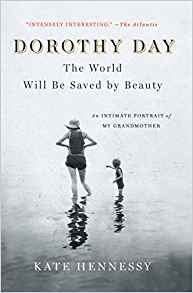 Kate Hennessy, Dorothy Day: The World Will Be Saved by Beauty; An Intimate Portrait of My Grandmother (New York: Scribner, 2017), 372pp.
Kate Hennessy, Dorothy Day: The World Will Be Saved by Beauty; An Intimate Portrait of My Grandmother (New York: Scribner, 2017), 372pp.
In the "Acknowledgements" at the end of this book, Kate Hennessy (b. 1960) says that it took her five years to write this family memoir about her "paradoxical grandmother" Dorothy Day (1897–1980), her many "complexities and contradictions," and in particular the deeply complicated mother-daughter relationship between Day and her only child Tamar (1926–2008). Well, it was worth the wait.
Hennessy, the youngest of Tamar's nine children, strips away the hagiography surrounding Day, who is now on track for Catholic sainthood, and the Catholic Worker movement that she founded with Peter Maurin in 1933. In many ways, this is a painful story that raises fundamental questions about the means and ends of ministry. Hennessy tells her family stories with a rare mix of candor, compassion, respect and, at the end of the day, genuine gratitude.
Stanley Vishnewski, a close friend of Day who joined the CW in 1934 and remained with them until his death in 1979, once observed that "people came to the Catholic Worker expecting to find saints, and instead they found human beings." Robert Ellsberg, who transcribed and edited Day's handwritten diaries, calls Hennessy's biography a "stunning work" that reminds us that "holy people are actual human beings." The real martyrs, it turns out, are those who have to live with the saints.
The subtitle of the book comes from one of Day's favorite writers that she loved to quote, Dostoyevsky. Says Hennessy, "If after years of struggle, weariness, and a sense of deep and abiding failure, my grandmother believed in salvation through beauty, then how can we not listen?"


